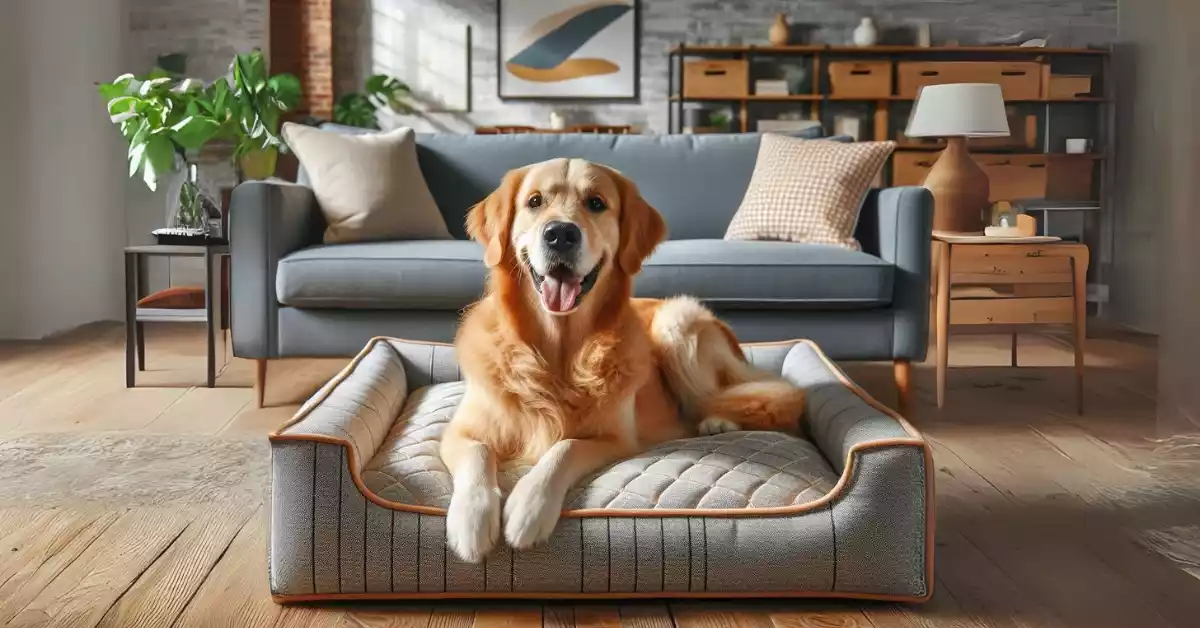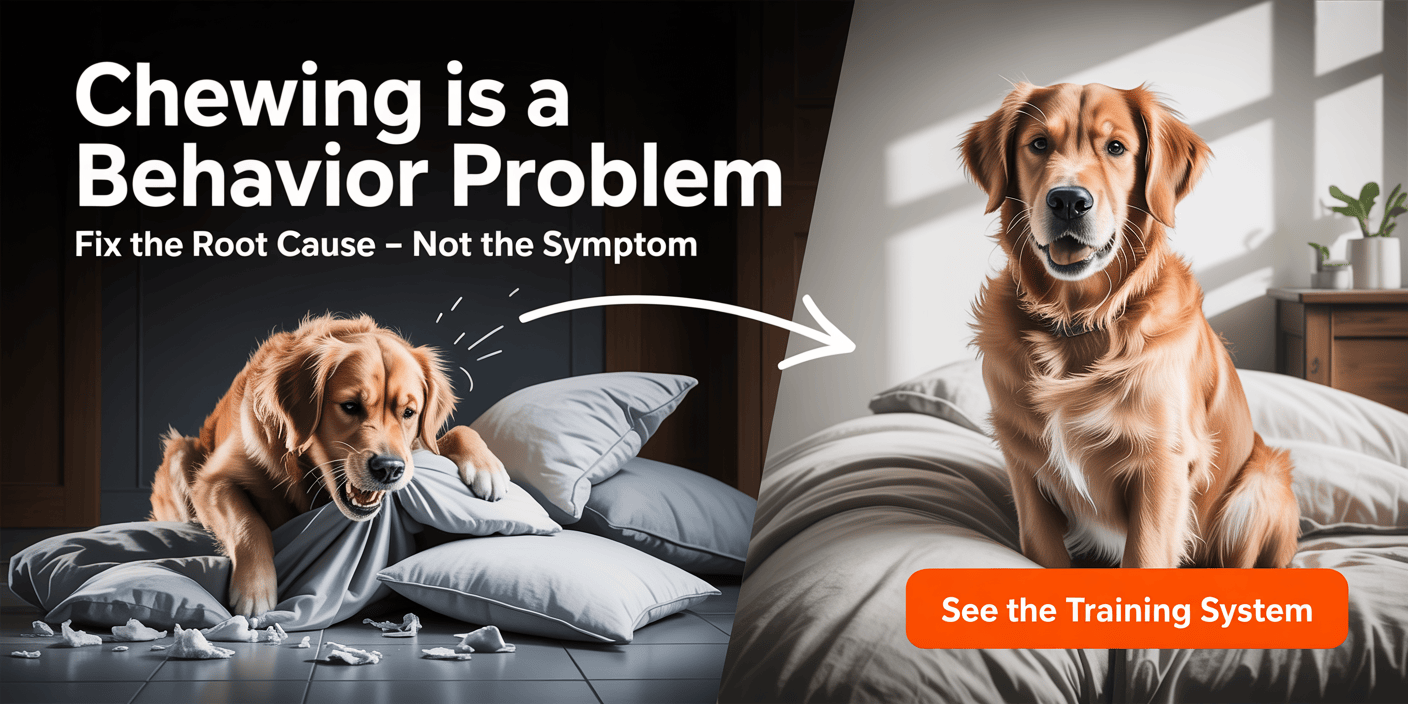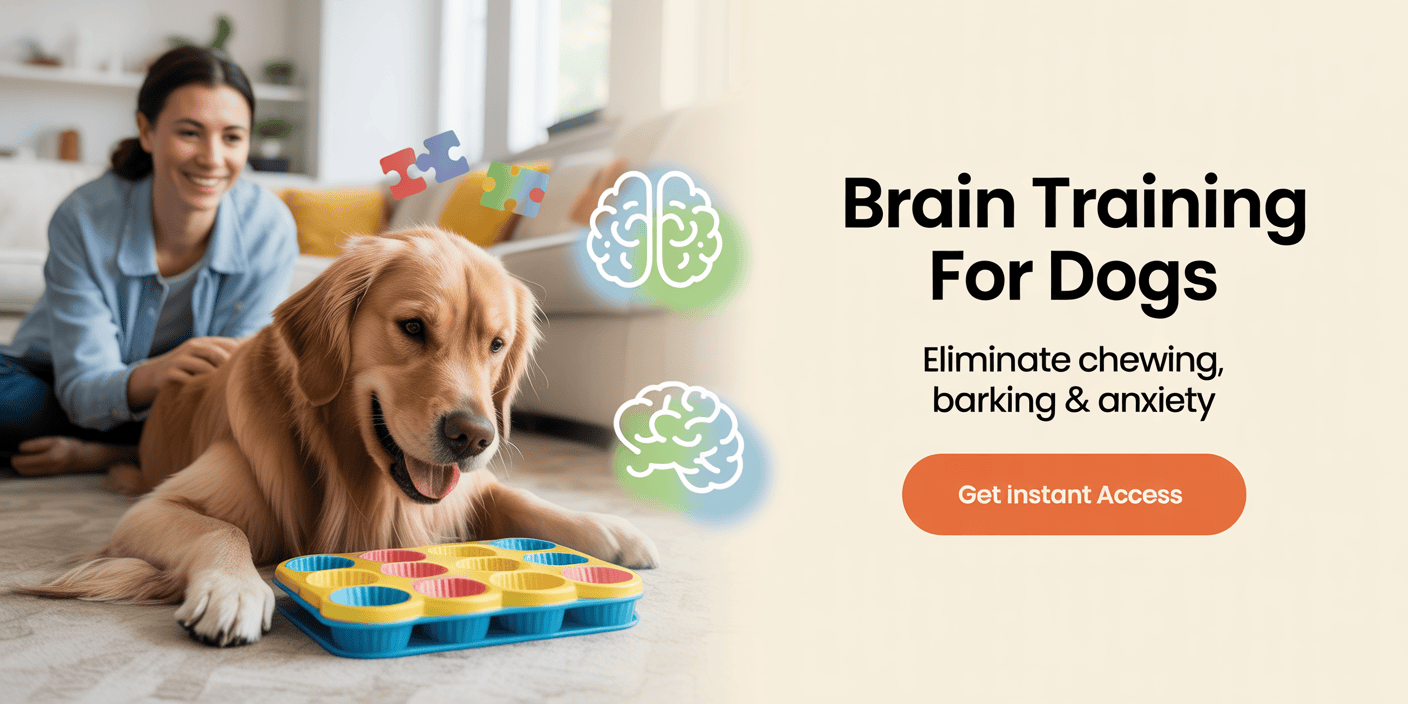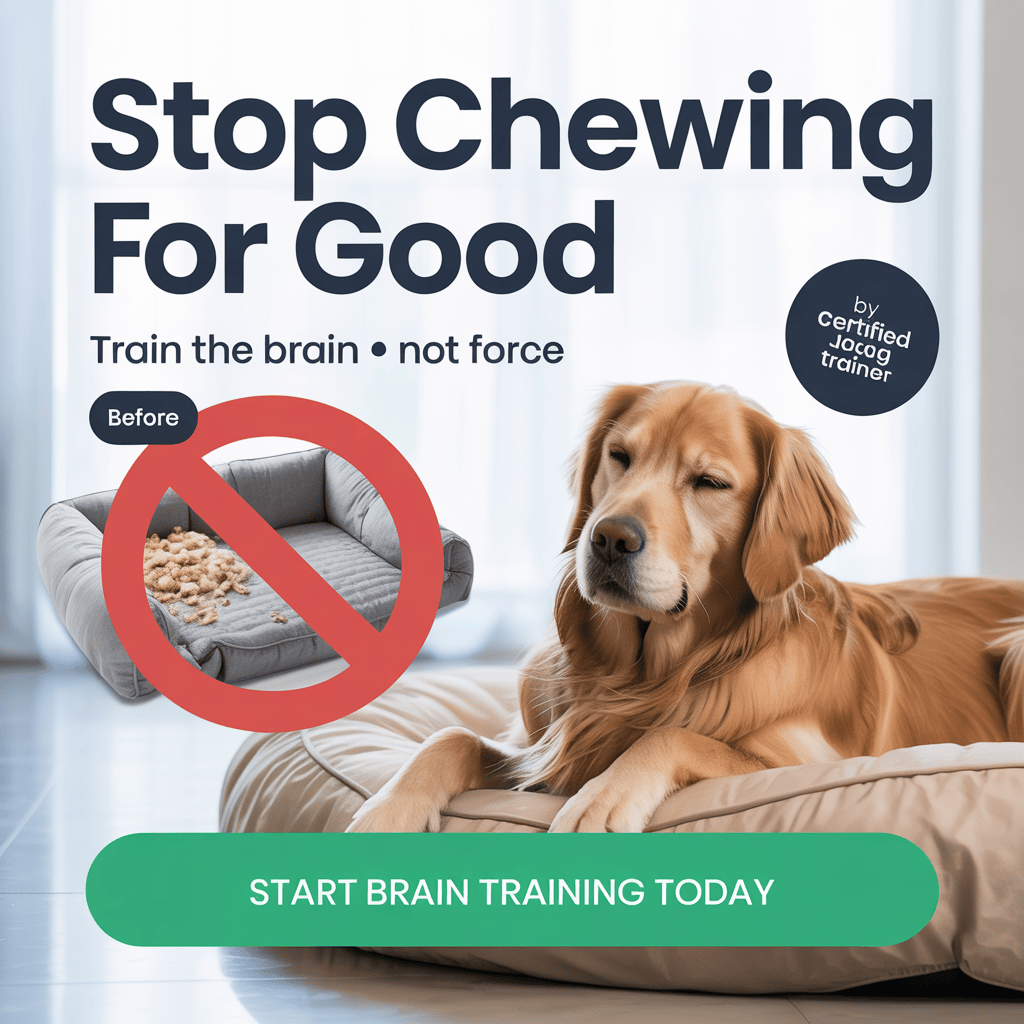Coming home to find your dog’s bed in shreds can be tough. It’s both frustrating and costly. But there are ways to stop your dog from chewing his bed. Dogs sleep a lot, about 12-14 hours a day. When they’re awake, they might act out, like chewing their bed. It’s sad to see, but you can stop this and protect your home.
This guide will cover why dogs chew their beds and how to stop it. We’ll look at separation anxiety and teething as reasons. Plus, we’ll give you tips to keep your dog from chewing his bed. These strategies will help you keep your home safe and your dog happy and healthy.
Key Takeaways
- Dogs sleep an average of 12-14 hours per day, but when awake, they can be quite mischievous.
- Destructive chewing behaviour can stem from various factors, including separation anxiety, boredom, stress, and teething.
- Providing appropriate chew toys, increasing exercise and playtime, and creating a peaceful sleep environment can help deter bed chewing.
- Upgrading to a durable, chew-proof dog bed can be a game-changer in preventing further damage.
- Seeking professional help from a veterinarian or animal behaviourist may be necessary in some cases to address the root cause of the behaviour.
Why Do Dogs Chew Their Beds?
Dogs chew their beds for reasons like separation anxiety, boredom, stress, and teething. Knowing why they do it helps pet owners find ways to stop this bad habit.
Separation Anxiety
Separation anxiety makes dogs stressed and unhappy. Chewing their bed is a sign of this. When alone, they might chew their bed for comfort. To help, start by leaving them alone for short times and gradually increase it.
Boredom
Dogs need fun and challenges to stay happy. If bored, they might chew their bed for fun. Try giving them toys and puzzle feeders with treats. This keeps them busy and stops bed chewing.
Stress
Chewing can be a way for dogs to relax if they’re stressed from past events or fears. To lessen stress, try massaging or brushing their fur. Calming aids like Thundershirts or Adaptil can also help.
Teething-Induced Chewing
Puppies chew due to pain from losing baby teeth and getting new ones. This usually stops by six months, but it can still damage a bed. Frozen treats or chew toys can ease their pain and stop bed chewing.
“Dogs are prone to chewing as a way of relaxing or releasing excess energy.”
It’s key to address why your dog chews to stop bed damage and keep them happy. By knowing the reasons and offering other activities, you can help your dog stop chewing and keep their bed safe.
How to stop a dog from chewing his bed
Dogs love to chew, and their beds are often their favourite targets. But chewing on a bed is not fun for anyone. It makes the bed look bad and is hard to clean. To stop your dog from chewing their bed, you need to teach them to chew on something else.
First, figure out why your dog is chewing their bed. It might be because they’re bored, stressed, or teething. Once you know the reason, you can fix it and stop the chewing.
- Provide Appropriate Chew Toys: Give your dog chew toys that fit their needs. These can be edible chews, puzzle toys, or frozen treats for teething.
- Increase Exercise and Mental Stimulation: Lack of activity makes dogs chew more. Make sure your dog gets enough exercise and fun activities every day.
- Use Deterrent Sprays: Spray something on your dog’s bed that they don’t like. These sprays taste or smell bad to dogs.
- Consider Anxiety-Reducing Strategies: If your dog chews due to anxiety, try using special dog pheromones or calming sounds when you’re away.
- Seek Professional Help: Sometimes, you’ll need a pro dog trainer or behaviorist to help with the problem and create a training plan.
Being consistent and patient is important when stopping bad habits like bed chewing. With the right methods and time, you can teach your dog to chew on other things. This will keep their bed clean.
Upgrade to a Durable Dog Bed
If you’re tired of constantly replacing your dog’s bed, it’s time for a change. Consider a chew-proof dog bed. The CordaRoy’s Forever Pet Bed is perfect for pet owners seeking a long-lasting option. It’s made with top-notch materials, so it can handle even the most energetic dogs. Plus, its cover comes off and goes in the washing machine, keeping your dog’s bed clean and fresh.
Don’t waste money on a bed that won’t last. Choose CordaRoy’s Forever Pet Bed for a cosy, long-lasting spot for your dog.
CordaRoy’s Forever Pet Bed has a unique design with faux fur on top and a nylon base. It’s comfy and chew-proof. The bed also has big rims and feels like a cloud, offering security and comfort for any size dog.
When introducing your dog to a chew-proof dog bed, like CordaRoy’s Forever Pet Bed, put it in a familiar spot. Use toys and treats to make it inviting. This will help your dog feel comfortable and stop them from chewing the bed.

Don’t let your dog’s chewing ruin your home. Get durable, dog-proof bedding like the CordaRoy’s Forever Pet Bed. Enjoy a peaceful, chew-free place for your dog to sleep.
Redirection and Deterrent Sprays
To stop your dog from chewing on their bed, you need a few strategies. One important method is to redirect their chewing to dog chew toys and teething puppy toys. When they chew on their bed, switch their focus to an interactive dog toy they can chew. This helps them learn what they can and can’t chew.
It’s also key to keep your dog from getting dog boredom and to keep their mind active. Try playing the TV or radio when you’re away to keep them entertained. Changing their toys and adding new ones can also stop boredom, and chew on things they shouldn’t.
Provide Chewable Toys
Make sure your dog has lots of tough, long-lasting dog chew toys. Having the right teething puppy toys and interactive dog toys helps them chew on something else instead of their bed.
Minimise Your Dog’s Boredom
Exercise and mental play are crucial to stop dog boredom and chewing. Playing with your dog for 30-60 minutes before leaving can help stop bed chewing. Also, puzzle toys and toys that make them work for their food can keep their mind sharp and stop dog boredom.
“Consistent training and positive reinforcement led to a 90% reduction in destructive chewing habits, including chewing on beds.”
Dealing with Anxiety-Induced Chewing
Anxiety-induced chewing is tough for dog owners to handle. Dogs with separation anxiety might chew on things when left alone, like their beds or household items. This chewing can be dangerous because it can lead to health problems if the fabric or stuffing gets stuck in their stomach.
To stop this chewing, it’s important to find out why your dog is anxious. You might need to give them more things to do, more exercise, and use calming products. Getting help from a professional behaviour therapist can also be very helpful.
While you work on your dog’s anxiety, consider getting a chew-resistant dog bed. This can save your dog’s bed from getting chewed up during anxious moments. Using behaviour therapy and a tough bed can help your dog stop chewing due to anxiety and keep their space safe.

Remember, being patient and consistent is key when dealing with chewing caused by anxiety. With the right steps and tools, you can help your dog find better ways to cope and stop the destructive behaviour.
What Not To Do
Dealing with a dog who loves to chew on their bed can be tough. It’s important to be patient and understanding. Your dog isn’t trying to upset you – they might be feeling anxious, bored, or teething. Don’t use punishment or negative reinforcement, as it can make things worse.
Instead, use positive reinforcement training. When you catch your dog chewing on their bed, stop them and give them something else to chew on. Reward them for chewing the right thing. This helps them learn what’s okay to chew.
If your dog has separation anxiety or other issues, talk to a vet or animal behaviourist. They can suggest things like behaviour therapy or calming pheromones to help your dog.
Being consistent and patient is key when teaching your dog not to chew on their bed. With the right approach, you can help your dog find better things to chew on and keep their bed safe.
Upgrade to a Durable Dog Bed
If your dog keeps chewing their bed, think about getting a tougher one. The Rhino Tough Collection and Rosewood’s Eco bed are great for chewers. They have strong stitching, can get wet, and don’t have zips or fasteners to stop your dog from chewing more.
Older dogs with arthritis might need a supportive, high-quality bed. Many owners are happy to spend on a good, stylish bed for their dogs.
Getting a chew-proof bed can make your dog feel safe and stop them from chewing their bed.
Exercising Your Dog and Providing Mental Stimulation
Chewing can happen if your dog is bored. Make sure they get enough exercise and fun activities. Things like walks, playtime, and interactive toys or puzzle feeders can help.
If your dog is chewing a lot because of a health issue, see a vet. They can help figure out what’s wrong and how to fix it. With the right help, you can stop your dog from chewing their bed.
| Bed Type | Key Features | Benefits |
|---|---|---|
| Rhino Tough Collection | Water-resistant, bleach-cleanable faux leather, no zips or fastenings | Highly chew and scratch-resistant for destructive dogs |
| Rosewood’s Eco Bed | Made from 100% recycled plastic | Resilient and robust choice for chewing dogs |
“Redirecting your dog towards toys and acceptable chewing items can be an effective way to manage their chewing behavior.”
Exercising Your Dog and Providing Mental Stimulation

If your dog is chewing his bed due to boredom, he might be showing signs of restlessness and frustration. To help, make sure he gets enough exercise and isn’t alone for too long, especially if he’s in a crate. Start by exercising him hard for 30 to 60 minutes before putting him in a crate. Also, never crate your dog for more than eight hours without giving him a break. If you can’t be there to let him out, ask a trusted friend or neighbour to do it for you.
It’s important to give your dog enough physical activity and mental challenges to stop dog boredom and dog chewing. Walking your dog twice a day for 30 minutes each time can help burn off energy, reduce boredom, and ease stress. Activities like training, playing, and going out can also meet their need for dog mental stimulation and stop bad behaviours like chewing.
A dog that is well-exercised and mentally stimulated is less likely to chew on things they shouldn’t. Giving your dog the right chew toys and bones can also help them chew naturally, keep their teeth healthy, and keep them away from your furniture or bedding.
| Activity | Duration | Benefits |
|---|---|---|
| Walking | 30-60 minutes, twice a day | Provide mental stimulation, strengthen the bond with owner |
| Training | 15-30 minutes per session | Provide mental stimulation, strengthen the bond with the owner |
| Playtime | 30 minutes or more per day | Relieve boredom, promote physical and mental well-being |
By making sure your dog gets enough exercise and mental challenges, you can stop the chewing behaviour and save your dog’s bedding from damage.
Using Deterrents and Finding Chew-Proof Solutions
To stop your dog from chewing his bed, try using a deterrent spray. But don’t just use the spray alone. You need to keep your dog busy and happy. A good way is to put a little bit of the spray on cotton wool or tissue. Then, let your dog taste it and spit it out. They’ll learn to avoid that taste in the future.
If your dog keeps chewing, think about getting a chew-proof dog bed. Some dogs love to tear up regular bedding. But there are now beds made just for them that can handle even the toughest chewers. The CordaRoy’s Forever Pet Bed is a great example. It’s made of strong materials and is designed to be chew-proof.
Use a Deterrent Spray
Bitter apple spray is a good choice to stop dogs from chewing. It tastes bad, and most dogs don’t like it. Make sure to spray it on regularly because it might not work as well over time.
Upgrading the Dog Bed to Something More Durable
If your dog keeps chewing his bed, it’s time for something stronger. Look for dog beds made to be chew-proof. They have extra layers and materials that can handle even the toughest chewers. These beds give you peace of mind and your dog a comfy place to sleep.
Finding the right solution might take some trying different things. Try out different deterrents and chew-proof products until you find what works for your dog. With patience and consistency, you can stop your dog from chewing his bed. This way, you can give them a safe and cosy place to rest.
Consistency and Patience are Key
Dogs naturally like to chew, but it can be a problem when they chew on things they shouldn’t, like beds. Giving them chew toys can help stop them from chewing their beds. Using positive reinforcement, like giving them a chew toy and praising them, can also help. Taking them for walks and playing with them can also help because it keeps them busy and happy. If your dog still can’t stop chewing, you might need to get help from a professional dog trainer or behaviourist.
Dogs chew because it’s something they naturally do, and sometimes they chew on their beds. This chewing can be because they are bored, anxious, teething, or not getting enough exercise. It’s important to figure out why they are chewing to stop it. Giving them chew toys that are tough and made just for dogs can help stop them from chewing their beds.
Playing with interactive toys, doing puzzle games, and training can help stop them from chewing because they are bored. Exercise also helps them not chew on their beds. You can use sprays that taste bad to keep them from chewing on things they shouldn’t. Making a safe place for them with a strong bed can also help stop them from chewing things they shouldn’t.
If your dog keeps chewing and you can’t stop it, you might need to get help from a professional. Being patient and consistent is very important in stopping your dog from chewing their bed.
Puppies usually stop chewing on things they shouldn’t be chewing on around six months to a year old. How long it takes can vary a lot from one puppy to another, based on things like breed, size, and training. Puppies chew because they are teething, bored, or not getting enough exercise. They might chew to get attention, deal with stress, or because they are anxious when left alone.
Training with positive reinforcement works well for puppies. Being patient and consistent is important in teaching puppies not to chew on things they shouldn’t. Making your home safe for puppies and giving them chew toys can also help. Watching them and correcting them when they chew on the wrong thing is key to training them.
“With patience and consistency, you can help your pup break their destructive chewing habits in no time.”
🚀 Tired of Your Dog Destroying Their Bed? Fix the ROOT Cause Today!
Chewing = Boredom + Untapped Intelligence! Adrienne Farricelli’s CPDT-KA certified Brain Training for Dogs doesn’t just stop bed-chewing—it transforms your dog’s behaviour by engaging their mind!
Why This Works for Destructive Chewers:
✅ Stops Boredom Chewing – 21 brain games drain energy the right way
✅ Fixates on Toys, Not Beds – Teaches impulse control via fun obedience drills
✅ Science-Backed – Uses neuroplasticity to rewire chewing urges
✅ 60-Day Guarantee – See changes or get your money back
🐶 Save Your Bed (& Sanity)!
👉 Click Here to Access the Training NOW! 👈
BONUS: Free “Behaviour Training for Dogs” guide (value $67) with purchase!
Conclusion
Chewing is natural for dogs. With the right approach, you can guide your pup to chew on things they shouldn’t. Upgrading to a tough dog bed helps. Also, give them lots of chew toys and keep their minds busy. Use sprays or sounds to stop them from chewing their bedding.
Patience and consistency are crucial. Don’t punish your dog, as it makes things worse. With the right methods, you can redirect their chewing to other things.
Up to 15% of dog owners struggle with their pets chewing on things they shouldn’t, like beds. But there are many ways to fix this. By figuring out why they chew, like boredom or anxiety, and using deterrents, redirection, and positive rewards, you can stop them from chewing their bed. This also saves your investment in chew-proof dog bedding.
With some effort and the right steps, you can help your dog stop chewing on things they shouldn’t. Give them lots of chew toys, make sure they get enough exercise and mental stimulation. And, get them a tough dog bed. This way, you can end their bed-chewing problem and have a peaceful, chew-free sleep area for everyone.
FAQ
Why do dogs chew their beds?
Dogs chew their beds for many reasons, such as separation anxiety, boredom, or stress. They might also chew due to teething. Giving them fun activities and solving any problems can help stop this.
How can I stop my dog from chewing his bed?
To stop your dog from chewing his bed, try giving him toys to chew instead. Use sprays to keep him away from the bed. Also, get a chew-proof dog bed. Training him well and making sure he gets enough play and thinking games are crucial, too.
What type of dog bed is best for chewers?
For dogs that chew a lot, a chew-proof dog bed like the CordaRoy’s Forever Pet Bed is perfect. It’s made with strong materials and can handle even the toughest chewers.
How can I deter my dog from chewing on his bed?
To stop your dog from chewing his bed, use sprays to deter him. You can also put cotton wool or tissue to get rid of the bad taste in his mouth. Giving him chew toys is also key.
What should I do if my dog’s chewing is due to anxiety?
If your dog chews because of anxiety, you need to deal with the root cause. Work with a trainer or vet to manage his anxiety and stop the chewing.
How can I keep my dog entertained and prevent boredom-related chewing?
Keep your dog busy with lots of exercise, fun toys, and games. Playing music or leaving the TV on can also entertain him when you’re not around.





